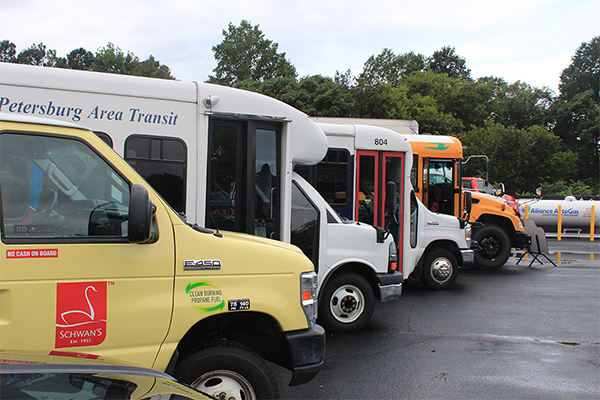Virginia fleets turn to renewable propane
The Virginia city of Petersburg’s police and shuttle vehicle fleets are converting 49 vehicles from gasoline to run on renewable propane.

The Virginia city of Petersburg’s police and shuttle vehicle fleets will be fueled with renewable propane. (Photo courtesy of Virginia Clean Cities)
Representatives from Virginia Clean Cities, Alliance AutoGas, the Propane Education & Research Council (PERC) and the city of Petersburg attended a ceremonial ribbon-cutting event to speak on the importance of the fuel technology.
“We want to celebrate and acknowledge the leadership that made this move to clean energy possible,” says Alleyn Harned, director at Virginia Clean Cities. “Transportation represents Virginia’s highest area of harmful emissions and is the costliest energy sector. Renewable propane is a major step forward to reduce emissions and lower the city’s fleet operating costs. As a transportation fuel, renewable propane brings improved energy security for Virginia and the region.”
Vehicle fleets around the nation have been significantly lowering their emissions by running on conventional propane autogas for decades. Now, renewable propane is growing in popularity as an even more sustainable and carbon neutral energy source. Propane autogas vehicles operating with renewable propane have a lower lifetime carbon footprint than electric vehicles charged using the electric grid in Virginia. Plus, they’re able to provide low-emissions benefits at a fraction of the cost of electric vehicles.
“Renewable liquid fuels will be an important factor in reducing transportation sector emissions in the next 30 years,” says Stuart Weidie, CEO of Blossman Gas, the founding member of Alliance AutoGas. “The carbon intensity of renewable propane is lower than a battery electric vehicle and provides both a near- and longer-term option to provide positive benefits for our environment. I am grateful for all the progression we have made to get to this point today and look forward to continuing our advancement with renewable propane.”
“Renewable propane autogas is already being used with great success by several fleets throughout the nation,” says Tucker Perkins, president and CEO of PERC. “Widespread use would significantly magnify emissions reductions today without additional costly infrastructure upgrades. Because the chemical structure and physical properties are the same as conventional propane, renewable propane can be used for all the same applications.”
Renewable propane is made from a mix of waste residues and sustainably sourced materials, including agricultural waste products, cooking oil and meat fats. In many cases, it’s a co-product of renewable diesel and sustainable aviation fuel production. At the point of combustion, renewable propane’s carbon intensity is four times lower than conventional propane and five times lower than diesel.
















